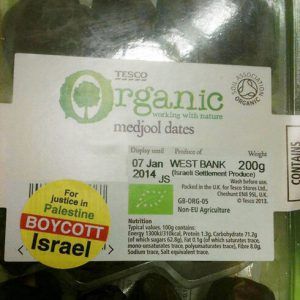The Irish Times has a habit of confusing journalism with activism when it comes to reporting on Israel. Last year, the newspaper didn’t just report on the Boycott, Divestment and Sanctions (BDS) campaign in Ireland, it told its readers how they could join in the boycott.
Now, the Irish Times has produced a puff piece of a story that reads like an advertorial for an anti-Israel organization. “Graphic illustration of Palestinian concerns” begins (emphasis added):
The first infographic produced for the website Visualising Palestine, published in February 2012, was sensational. It showed what happens during hunger strikes, giving examples from history and featuring Palestinian administrative detainee Khader Adnan, who persevered for 66 days before Israel agreed to free him.
“Sensational?” Bear in mind the attitude of much of the media when it comes to reporting on Israel’s social media outreach, routinely dismissed as propaganda, the attitude of the Irish Times towards what could be accurately described as Palestinian propaganda could not be more different.
According to the article, the objective of Visualizing Palestine is (emphasis added):
to illustrate in a single graphic what is happening in the occupied Palestinian territories, in order to make an impact on global public opinion, which largely has been shaped by an expertly processed Israeli narrative.
While the Irish Times would never run an expertly processed Israeli narrative, the newspaper is more than willing to help make an impact on public opinion on behalf of the Palestinians. The newspaper would almost certainly refrain from republishing the IDF’s infographics. So why is it acceptable to devote an entire gallery to several slides illustrating two series of infographics?
The first, “Hunger Strikes,” is meant to elicit sympathy for the self-induced suffering of Khader Adnan, who chose to go on hunger strike while in administrative detention. Of course, not mentioned is Adnan’s background as a member of the Islamic Jihad terrorist organization.
The second infographic series, “A Guide to Administrative Detention,” never addresses the possibility that those in administrative detention may have been taken into custody for genuine reasons e.g. terrorism and security offenses.
The man behind these infographics, Ramzi Jaber makes an implicit reference to a single unitary state, a solution advocated by those who wish to see a Jewish state of Israel replaced by a state of all of its citizens and ultimately, an Arab majority state (emphasis added):
Ramzi dismisses the notion that there is a distinction between Palestinian territories occupied in 1967 and Israel.
“All Palestinian IDs are approved by the Israeli interior ministry. There is one territory, one border, one army, one economy, all controlled by Israel.”
On an issue of journalistic style, the norm is for a subject’s last name to be used throughout an article. In this case, however, Irish Times journalist Michael Jansen, as if referring to a buddy, calls Ramzi Jaber by his first name repeatedly. Perhaps this is indicative of a story where the journalist identifies with the protagonist. Given the overly sympathetic reportage of Visualizing Palestine, this isn’t altogether surprising.
Jaber is given license to make out of context claims such as:
“After the Israeli occupation in 1967, all of the West Bank’s water was given to Israel’s Mekorot company for one shekel.”
As Hebrew University Professor Yoav Kislev, an expert on water issues, writes:
In 1967 there were running water systems in only 50 of the 430 Palestinian localities in the West Bank; the rest used water collected in cisterns and carried water to their homes in jars and containers. After the Six Day War responsibility for the water economy in the territories was transferred to the Civil Administration and the water supply was extended to Palestinian locations and refugee camps (Sherman, 1999, p. 63). In 1982 the infrastructure that had been developed was transferred to the Mekorot company, and it provided water to the Palestinians and later also to the settlements. Most of the development occurred in the first decade after the war but later too there was a certain growth in the supply to Palestinians. By the early 1990s about 200 localities were connected to the Mekorot network.
The reality was that Palestinian access to water supplies was actually expanded as a result of a transfer to the Israeli national water supplier.
The Irish Times even goes as far as to mention Visualizing Palestine’s campaign to secure donations. After such a sympathetic and biased article, perhaps Irish Times readers will decide to give generously.
The Irish Times’ anti-Israel activism can only contribute to an environment that encourages this. YNet News reports:
 A pro-Israeli activist residing in Dublin, Ireland, was shocked this week when he discovered that a Boycott, Divestment and Sanctions (BDS) organization had taped yellow stickers on Israeli products reading “For justice in Palestine, Boycott Israel”.
A pro-Israeli activist residing in Dublin, Ireland, was shocked this week when he discovered that a Boycott, Divestment and Sanctions (BDS) organization had taped yellow stickers on Israeli products reading “For justice in Palestine, Boycott Israel”.
Among the many items found carrying the yellow boycott sticker was a pack of dates from the Jordan Valley. One of the stickers read: “Organic dates – produce of West Bank; Israeli Settlement Produce.”
The call for boycott is directed not only at products made in Israeli settlements but at Israeli products altogether – even though the sticker notes the product was made in the West Bank. Similar stickers were placed on other products in the Tesco supermarkets chain.
You can send your considered comments to the Irish Times – [email protected]. All letters intended for publication should be clearly marked “Letters to the Editor” and should include the writer’s full name, postal address and telephone numbers (day and evening) in order to stand a chance of publication.


